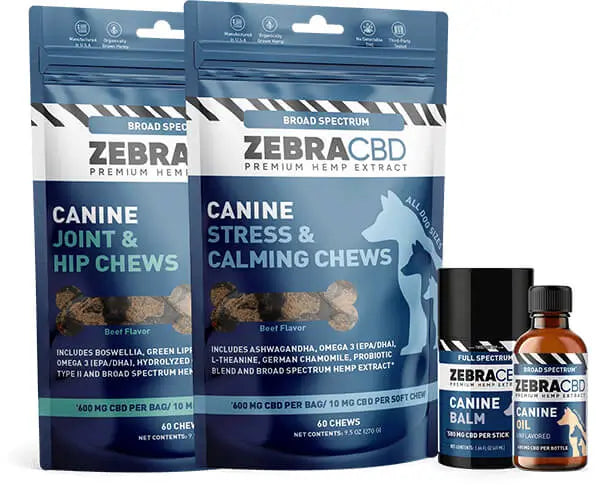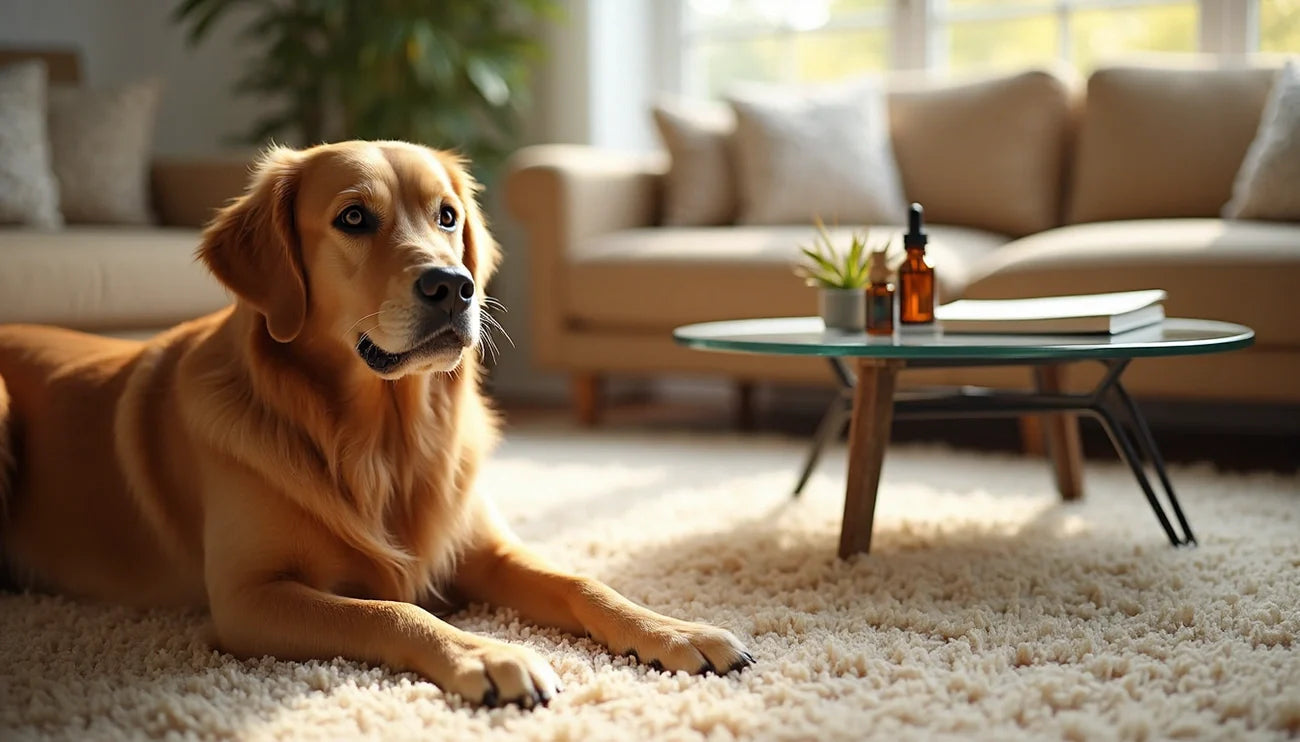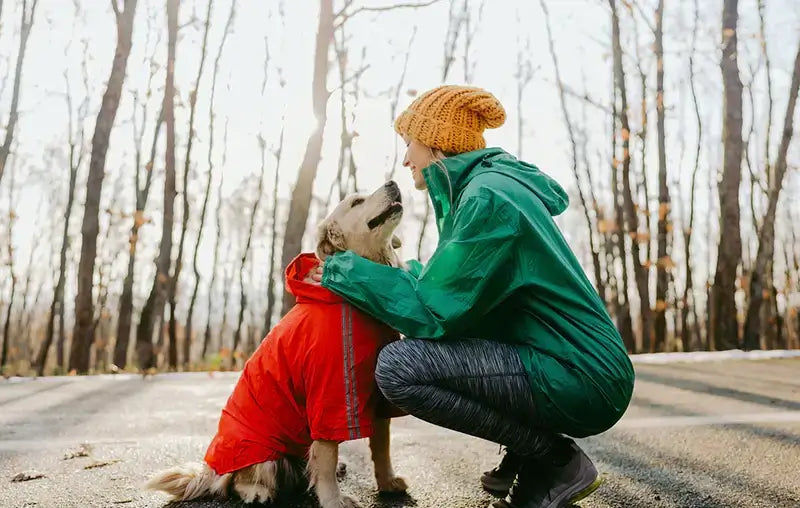
You take a walk with your dog, the sun is shining brightly and when you get home, your dog is panting excessively — drool dripping from their elongated tongue.
All dogs pant, especially on a warm day or after exerting themselves, but when does it move from a normal pup activity to a cause for concern?
While panting is a normal part of any canine’s behavior, some factors might be driving it. Luckily, there are steps you can take that might lessen or ease your dog’s behavior. If you’re asking yourself, “why is my dog panting so much?”, read on to learn more about what causes excessive panting and how to alleviate the behavior in your dog.
Why Do Dogs Pant?
Panting is natural for dogs — as natural as normal breathing. You’ve probably noticed your panting dog huffing and puffing after a strenuous walk or a romp on a hot day, or if they’re particularly excited about something, like a treat or a familiar face.
But what is panting and why do dogs do it? Most often, it’s a natural response to cool down, not a need for more oxygen.
Imagine your own body on a hot summer’s day — your heart’s most likely pounding and sweat is probably dripping down your forehead.
Our sweat glands play an important role in helping cool us off and regulate our body temperatures during exercise or on hot days to avoid heat exhaustion — panting does the same for dogs.
Why? While all mammals need to have the ability to regulate their body temperature, not every animal has sweat glands in the way that humans do. Dogs do have some sweat glands, but they’re mostly confined to under their paws and behind their ears. As such, panting is their primary way of keeping cool.
What is Panting?
Panting serves the same function as sweating — it regulates the body temperature and cools overheated skin. But did you know that panting and sweating both rely on evaporation to keep you cool?
When dogs pant, they breathe faster and more shallowly than normal. This sped-up breathing hastens the rate of evaporation for the moisture contained in your dog’s mouth, throat and tongue, helping to bring down their heightened temperature and return them back to a comfortable state.
Most animals pant to keep cool — in fact, the only other mammals who use sweating as their primary cooling method besides humans and other primates are horses. Even birds pant!
How Do I Know When My Dog’s Panting is Normal?
Panting is very normal behavior for a dog and it’s rarely something to worry about. However, if you notice your dog’s panting appears like out of control heavy breathing or if it happens out of the blue (i.e., not after a long walk, on a day with hot weather, or when your dog appears particularly excited about something), it, or any other abnormal dog panting, might be something to keep an eye on.
It can be helpful to get an idea of your dog’s baseline respiratory rate so that you know what’s normal for your dog and what isn’t. Dogs typically breathe between ten to thirty times a minute.
As a dog owner, you may want to make an appointment with the veterinary medicine practitioner if your pup exhibits abnormal panting or breath that is:
- Frequent
- Short
- Raspy
- Labored
What Might Be Making My Dog Pant?
While most panting is considered totally normal behavior for your dog, there are some ailments outside of the common causes that might be contributing to breathing difficulty or heavy panting, especially if the panting seems to come with other symptoms like shaking, whining, or a general sense of discomfort. Read on to learn what might be driving your dog’s excess panting.
1. Over Heating
One of the most serious causes of excessive panting is overheating. Dogs who become too hot may exhibit:
- Glassy eyes
- Indigestion
- Dehydration
- Lethargy
- Visible discomfort
If you believe that your dog may be overheating, move them to a shaded area and either submerge them in cool water or wrap towels soaked in cool water around them. As soon as you feel your dog has recovered enough to be moved, take them to their vet for a thorough examination.
2. Injury or Discomfort
Sometimes, it may not be immediately obvious when your dog may have injured themselves, and unfortunately, they’re not able to tell us themselves that they’ve been hurt.
When dogs hurt, they signal their discomfort with behaviors like loss of appetite, restlessness and panting. They may also lick or bite at the site of injury.
If your dog injured itself, take them to the veterinarian as soon as possible for examination and treatment. However, if your dog is suffering from a long-lasting injury that’s causing them low-level discomfort, you might want to consider taking action.
In addition to physical therapy and touch, consult a veterinarian and incorporate the following relief solutions:
- Gentle massage – Carefully rub your dog’s sore muscles as they’re lying down to release tension and soothe them.
- Passive range of motion (PROM) – As your dog is lying down, gently move their limbs in a circle in one direction, then the other. This helps boost your pet’s range of motion and promotes healthy mobility.
- Light exercise – Consider modifying your usual walk routes and playtime routine as your dog recovers. Avoid rambunctious play or long or fast-paced walks, as well. Instead, focus on providing your dog with easy, regular movement to keep them lightly active and give their body the chance to recuperate.
- CBD – You may also want to consider introducing a CBD supplement to your dog’s routine, like CBD Oil for Dogs. Hemp extracts may help ease occasional joint stiffness due to normal daily exercise and activity, which may boost your dog’s overall health and vigor. Find a formula that contains coconut MCT oil as it can heighten CBD’s bioavailability.
3. Nervousness
If you’re asking yourself, “why is my dog panting so much at night?”, it may be due to feelings of nervousness or panic. While your pup may not be able to verbalize their emotions and feelings in the same way as us, they’re every bit as real — and have just as much of an impact on your dog’s overall wellbeing.
Excessive panting as a result of nervousness is known as “behavioral panting” and is part of a larger range of stress signals that include:
- Whining
- Unusually shy or reclusive behavior or clinginess and neediness
- Tucked tail
- Trembling
- Drooling and lip licking
- Loss of appetite
- More “accidents”
- Crouched, defensive positions
What causes stress in dogs? While some dogs are naturally more high-strung and prone to a more nervous temperament, there’s often a cause that you can point to that’s driving your dog’s nervousness.
Your dog may feel afraid if they’re in a situation that they perceive as a threat, if they experience nervousness when apart from you, or if there’s an external trigger that they’re frightened of, like loud noises from fireworks or a noisy household appliance.
If your dog seems panicked and you’re wondering how to calm down a nervous dog, the first step is to try to identify the underlying cause that might be triggering it. If it’s something easily avoided, like fireworks or another dog acting aggressively towards them, try to remove your dog from the situation and avoid exposing it to them in the future. The same can be said about how to make a dog stop barking.
If it’s something that your dog will need to eventually grow comfortable with, like the sound of the vacuum cleaner or long hours while you’re away at work, consider gradually reintroducing them to what frightens them and rewarding them with treats and praise when they’re able to cope with it comfortably.
Bonus Tip: You could also consider using CBD to help soothe your dog’s nervous temperament, like CBD Dog Calming Chews. CBD chews may help your pooch to shake off the stress and may help ease their nervous feelings, especially if you’re not the best at giving a dog a pill.
Panting? Don’t Panic!
Panting is a completely normal part of any dog’s behavior — it’s how they keep cool and show their excitement. But if you feel like your dog is panting more than normal, nervousness or discomfort may be driving their behavior.
If you’re looking to ease your pup’s discomfort, look to Zebra CBD’s line of CBD products. Formulated with ingredients that naturally help to heighten the bioavailability of serotonin and dopamine in the brain, along with 10 milligrams of premium hemp extract and brain-boosting omega-3 fatty acids, your dog will feel relaxed and happy again in no time.
Sources:
Daily Paws. Why Is My Dog Panting So Much? https://www.dailypaws.com/dogs-puppies/dog-behavior/common-dog-behaviors/dog-panting
Smithsonian Magazine. From Panting to Pooping, 8 Weird Ways Animals Keep Cool. https://www.smithsonianmag.com/science-nature/panting-pooping-8-weird-ways-animals-keep-cool-180952226/
Fetch by WebMD. Why Is My Dog Panting Heavily? https://pets.webmd.com/dogs/dog-panting-heavily
PetMD. Why Do Dogs Pant? Is Your Dog Panting Too Much? https://www.petmd.com/dog/behavior/evr_dg_why_do_dogs_pant
Dog Wheelchair Life. 9 Dog Physical Therapy Exercises You Can Do At Home. https://dogwheelchairlife.com/9-dog-physical-therapy-exercises-you-can-do-at-home/










